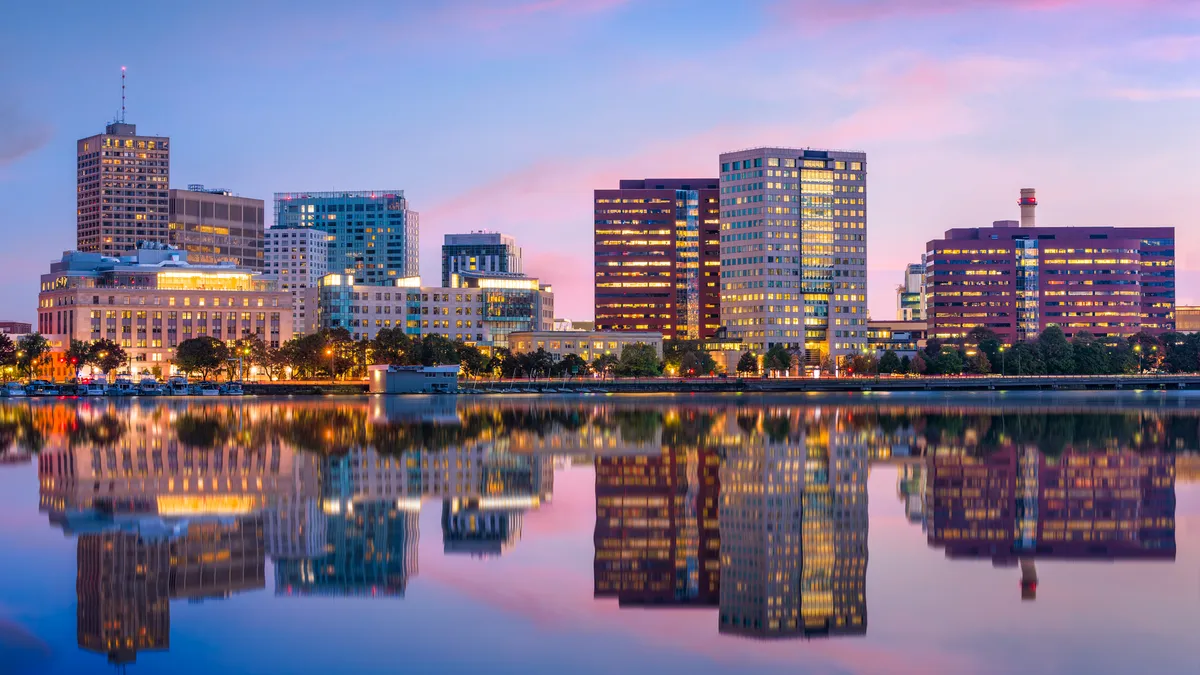Dive Brief:
- Cambridge, Massachusetts, has become the first U.S. city to require non-residential buildings to cut their greenhouse gas emissions, according to a June 27 press release.
- Cambridge is mandating that buildings larger than 100,000 square feet achieve net zero by 2035. Mid-sized buildings have until 2050.
- The city’s Building Energy Use Disclosure Ordinance, or BEUDO, is being amended to meet these targets, with an intent to slash emissions by roughly 50% from current levels by 2030 and as much as 70% by 2035.
Dive Insight:
Cambridge’s greenhouse gas emission reduction mandate follows two years of active engagement with climate activists, businesses, institutions, residents and other stakeholders. Those stakeholders include members of the BEUDO buildings group, led by the City of Cambridge’s Climate and Energy team, which is part of the city’s Community Development department.
The Net Zero Task Force, Cambridge Climate Committee and the Climate Crisis Working Group also pressed for stronger BEUDO performance requirements.
Staying within the 1.5 degrees Celsius climate change threshold is beyond reach without immediate and deep emission reductions, according to scientists with the Intergovernmental Panel on Climate Change, whose global report issued last year said that a two-thirds reduction of carbon pollution is needed to mitigate the impacts of climate change.
The proposal to advance the net zero goal from 2050 to 2035 is the biggest change made as part of the proposed BEUDO amendments, the latest of which was updated last June, after several stakeholder engagement meetings with Cambridge City councilors Patricia Nolan and Quinton Zondervan.
BEUDO, first passed in 2014, regulates approximately 1,100 buildings in Cambridge and requires energy and water reporting from commercial properties that are more than 25,000 square feet, and residential properties spanning more than 50 units. Efforts to deflect the worst impact of climate change “will include greening the electrical grid as well as building energy efficiency and transitioning from fossil fuel use to electricity, geothermal or other renewable energy sources,” the City of Cambridge said in the June 27 release.
Cambridge’s BEUDO amendment process started in a similar way to Boston’s Building Emissions Reduction and Disclosure Ordinance amendment, or BERDO 2.0, signed into law in October 2021.
“As 16 of our members own buildings in Cambridge, with an additional number of large tenants or property managers, we have also been engaged in the recent process to amend Cambridge’s Building Energy Use and Disclosure Ordinance which applies to existing buildings in Cambridge,” wrote Yve Torrie, director of climate, energy and resilience at A Better City, which engaged with the city of Boston during the BERDO 2.0 amendment process.
A Better City told Boston Business Journal, however, that “we are not confident that the grid, technological, onsite renewable energy, and workforce development challenges, to name a few, can be addressed expeditiously and equitably enough to meet a 2035 goal.”
Cambridge’s Ordinance Committee is due to meet July 26 for continued discussions on BEUDO.















